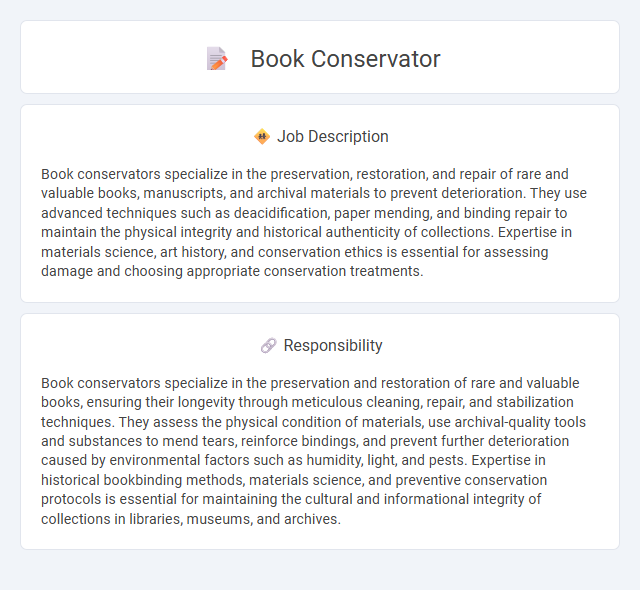
Book conservators specialize in the preservation, restoration, and repair of rare and valuable books, manuscripts, and archival materials to prevent deterioration. They use advanced techniques such as deacidification, paper mending, and binding repair to maintain the physical integrity and historical authenticity of collections. Expertise in materials science, art history, and conservation ethics is essential for assessing damage and choosing appropriate conservation treatments.
Individuals with a keen eye for detail and patience may be well-suited for a book conservator role, given the delicate nature of handling rare and fragile materials. Those who are sensitive to repetitive tasks and possess steady hands probably have a higher likelihood of success in preserving and restoring books. Candidates with allergies to dust or mold might find the working environment challenging, potentially making this profession less suitable for them.
Qualification
A book conservator typically requires a degree in conservation, library science, or art history, often supplemented with specialized training in paper and book conservation techniques. Proficiency in chemical treatments, materials analysis, and restoration methods is essential, along with hands-on experience gained through internships or apprenticeships in conservation labs or libraries. Strong attention to detail, knowledge of historical book materials, and skills in preventive care are critical qualifications for preserving and restoring rare and valuable books.
Responsibility
Book conservators specialize in the preservation and restoration of rare and valuable books, ensuring their longevity through meticulous cleaning, repair, and stabilization techniques. They assess the physical condition of materials, use archival-quality tools and substances to mend tears, reinforce bindings, and prevent further deterioration caused by environmental factors such as humidity, light, and pests. Expertise in historical bookbinding methods, materials science, and preventive conservation protocols is essential for maintaining the cultural and informational integrity of collections in libraries, museums, and archives.
Benefit
A book conservator likely experiences significant benefits including preserving historical and cultural artifacts for future generations, which may provide a strong sense of professional fulfillment and purpose. The role probably offers opportunities to develop specialized skills in preservation techniques and material science that could enhance career advancement. Working in varied environments such as museums, libraries, or private collections might also increase job satisfaction through diverse project exposure.
Challenge
Book conservator roles likely involve complex challenges related to preserving delicate materials without compromising historical integrity. The probability of encountering rare or fragile items may require advanced restoration skills and specialized knowledge of conservation science. Managing unpredictable deterioration patterns and balancing preservation with accessibility could also pose significant difficulties in this profession.
Career Advancement
Book conservators enhance the longevity of rare and historical texts through specialized preservation techniques and restoration skills. Career advancement opportunities include roles such as lead conservator, conservation scientist, and museum or library conservator, often requiring advanced degrees or certifications in conservation or library science. Gaining expertise in digital preservation and securing experience with high-profile collections significantly boosts prospects for promotions and leadership positions within heritage institutions.
 kuljobs.com
kuljobs.com